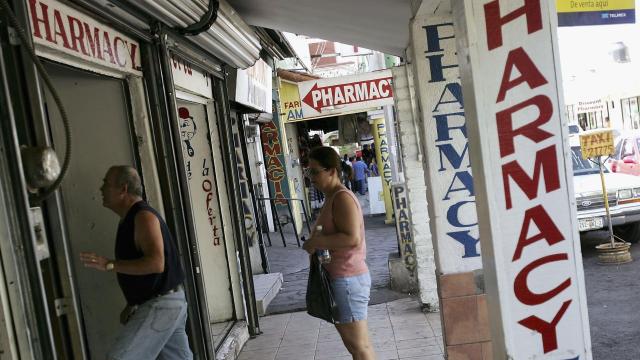Customers seeking Adderall, Oxycodone, and other medications at Mexican pharmacies are being sold counterfeit pills containing dangerous substances like methamphetamine and fentanyl.
In the northwestern cities of Tijuana, Cabo San Lucas, and San José del Cabo, pills advertised and sold as legit pharmaceuticals from actual pharmacies tested positive for the much stronger substances, according to an investigation from the Los Angeles Times.
Of 17 pills analysed by the investigative team, 71% were found to contain either fentanyl or meth, according to the report. The journalists detected fentanyl in pills that were supposedly oxycodone or hydrocodone — both frequently prescribed opioid painkillers. Methamphetamine popped up in supposed Adderall pills.
Fentanyl is a synthetic opioid similar to morphine, but about 50 to 100 times more potent, according to the National Institute on Drug Abuse. It is sometimes legally prescribed by physicians for pain management. But it’s also frequently sold illegally and is a common adulterant among street drugs. Though the idea that fentanyl is strong enough to cause overdose simply through touch is a scientifically unfounded urban legend perpetuated by police, the drug is known to be a contributing factor to the rise in overdose deaths that’s been observed across the U.S. over the past decade.
Adderall and methamphetamine are closely related amphetamine stimulants, but meth is a much more powerful substance.
Though abuse of both meth and fentanyl has been rising, the emergence of both substances in pharmacy supply chains signals a new danger. Whether prescribed or not, people who seek drugs from pharmacies generally do so believing they’re getting what they’re told. Yet the new data suggests otherwise.
The LA Times report findings back up the results of a similar pre-print study from UCLA researchers. In that analysis, the scientists found that more than a quarter of the 40 pharmacies they visited were selling counterfeit pills. Further, some pharmacies in Mexico will offer customers single pill “samples” of medications, and the researchers noted among theses pill “samples,” about 44% were laced with unadvertised substances, including meth, fentanyl, and heroin.
Moreover, tourists from the U.S. might be particularly vulnerable to encountering adulterated medications. “Pharmacies providing counterfeit drugs were uniformly located in tourist-serving micro-neighbourhoods, and generally featured English-language advertisements,” wrote the UCLA study authors.
It’s not just an issue of proper medical treatment or false advertising — it’s a problem of life and death. “Whenever you have counterfeit products that contain fentanyl, you are going to have people use them and die,” Chelsea Shover, an epidemiologist at UCLA and one of the pre-print researchers, told the LA Times.
Medical tourism from the U.S. to Mexico has become increasingly popular in recent years as people seek more affordable care beyond U.S. borders. Mexico is also a popular destination for those seeking drugs for recreational use because many things that require a prescription in the U.S. can be obtained from Mexican pharmacies without one, according to UCLA and the LA Times.
Potentially exacerbating the number of Americans headed south to find medication: an ongoing shortage of Adderall in the U.S.. For those who rely on the stimulant to manage their ADHD, the lack of available supply in the U.S. could prompt them so look elsewhere. The shortage could also potentially explain why meth is being used as a supplement or replacement in counterfeit pills.
Though there isn’t currently a shortage of oxycodone or hydrocodone, the counterfeit, fentanyl-laced medications may be cheaper or easier for pharmacies to obtain, and more profitable to sell than the real versions.
The issue of falsified or low quality medications isn’t entirely novel. About 1 in 10 medical products sold in developing countries were estimated to be “substandard,” according to a 2017 report from the World Health Organisation. Yet low quality drugs are a different story from pharmacies selling counterfeit pills laced with dangerous substances.
“I haven’t seen anything like that [before],” Celia Farfán-Mendez, a UC San Diego researcher who studies cartels, told the LA Times. “I think it speaks to the lack of law enforcement monitoring what’s happening in the pharmacies.”
For Stover’s part, the UCLA scientist noted the extreme amount of uncertainty surrounding the problem. Unlike the U.S., Mexico doesn’t keep reliable statistics on the number of drug overdose deaths. The country reported just 1,700 fatalities from all drugs in 2020, a suspiciously low number compared with the U.S. stat of more than 91,000 deaths in the same time period. And if Mexico isn’t tracking overdoses, it’s hard to hone in on the scope of harm the counterfeit pills could be causing.
“We don’t know exactly when this started, and we don’t know how widespread it is,” Stover told the LA Times. “We don’t know who’s buying these pills, we don’t know who’s taking them, and we don’t know what’s happening to the people who take them. The most important unknown is probably how many people have died or had serious health consequences from it, and we don’t have any idea.”
